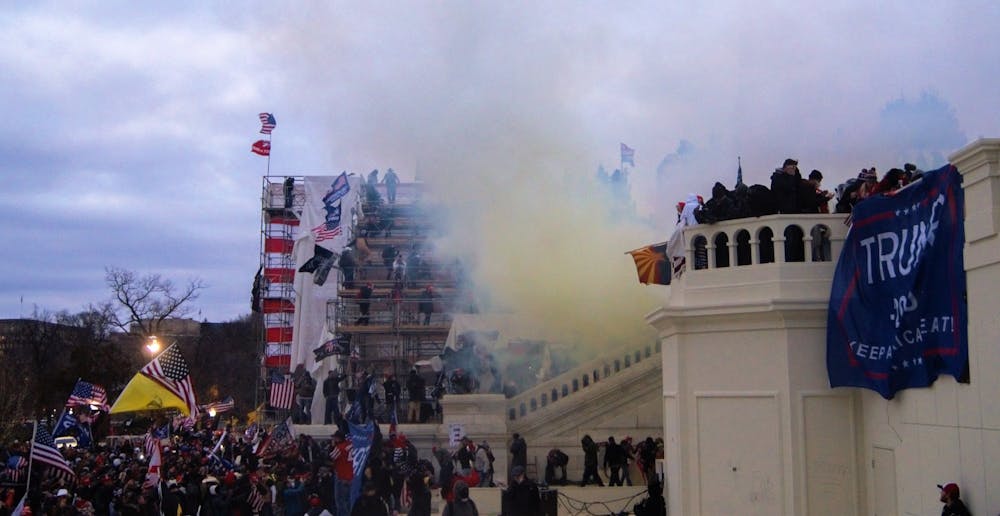中文版请点击此处
Less than four years ago, white supremacists and neo-Nazis converged on Charlottesville in what would become the most grotesque exhibition of far-right prejudice and bigotry in recent memory. The terror of Aug. 11 and 12, 2017 resurfaced Jan. 6 with immeasurable intensity as thousands of pro-Trump rioters stormed the nation’s Capitol in a baseless attempt to overturn the results of the 2020 election. Frighteningly similar to the violence of the 2017 Unite the Right rally, the events of Jan. 6 have once again turned national attention towards Charlottesville — the community cited as the inspiration for a presidential campaign, yet nonetheless deemed unworthy of a presidential visit. Perhaps reflecting such dismissive attitudes, in a moment demanding strong condemnation, the University community was met with a disturbingly weak response from its leadership — a response that, for many, borders on silence.
Indeed, with all eyes on Charlottesville, University President Jim Ryan expressed a “mixture of anger, disbelief and sadness” in an introduction to the Jan. 6 Democracy Dialogues event with Professor Larry Sabato. Although denouncing what he labeled an “attack on our democracy,” President Ryan’s condemnation of the violence ended there. In a community for which far-right extremism continues to plague collective memory, such a lackluster response is, quite simply, insufficient. At the very least, President Ryan has a duty to condemn the Jan. 6 riots in a statement to all University community members — not simply those present at a preplanned event. As noted in a previous criticism of President Ryan’s response to the murder of George Floyd and the protests that rocked the nation in 2020, we look to the leaders of our educational institutions as an example of change and strength in tumultuous times. In this moment, however, such an example is notably lacking.
Further, University leadership must reassert its commitment to combating widespread prejudice and systemic inequity in and beyond the University community. Although some argue that the Jan. 6 riots were not explicitly motivated by white supremacy, the presence of a Confederate flag in our nation’s Capitol Building suggests otherwise. Like the violence of the 2017 Unite the Right rally, the events of Jan. 6 were yet another manifestation of the deep-seated racism that has terrorized BIPOC communities in the United States for centuries. In a University built by slaves and once celebrated as a center of eugenicist thought and practice, any failure to strongly condemn the recent attack on our nation’s democracy represents a failure to renounce a legacy of Black exploitation. This in turn perpetuates the suffering of the University’s Black and Brown communities as well as that of the Charlottesville community at large — a community whose past, present and future is indelibly tied to that of the University.
Indeed, as noted in a recent Cavalier Daily opinion column from Bryce Wyles, the lack of an adequate response to prejudice only allows such prejudice to grow. The same is true in this situation. Among Charlottesville community members, the consequences of the 2017 Unite the Right Rally extend far beyond momentary destruction and a fleeting terror. They are, in effect, a source of ongoing exploitation and visceral human suffering. Similarly, the University community is intimately familiar with intolerance and bigotry, a familiarity sustained by an administrative failure to respond to acts of prejudice like that at our nation’s capital. In the past semester alone, students have constructed and violently destroyed a wall with the phrase “Black Lives Matter'' and a professor has made racially insensitive remarks in an effort at humor during a lecture.
Both instances — along with the countless other aggressions experienced by BIPOC students on a regular basis — passed relatively unpunished among University administrators. This in turn resulted in the normalization of such behavior in our community. Reflecting this pattern of inaction, recent administrative failures to adequately respond to the violence at the Capitol Building — a building uniquely symbolic of a national legacy of racism — sends a silent message that hatred and violence, though not openly celebrated, are also not publicly condemned in the University community. Such a message is more than exclusionary. It is oppressive. It is violent. It is dangerous.
The University has a unique opportunity to tackle its legacy of prejudice and to act as an example of growth and acceptance for institutions throughout the United States. Last month’s acts of terror at the Capitol are just another manifestation of the terror that plagued Charlottesville in 2017 and, for that matter, the terror that has tormented the University’s non-white community since its inception. As we have seen, true change requires much more than an isolated, weak response to such events as they occur. It first demands strong and unwavering condemnation and, later, a commitment to sustained dialogue and the ongoing, systemic support of the University’s BIPOC communities. After all, continued silence in the midst of prejudice only signals acceptance — an acceptance that perpetuates a legacy of hatred, exclusion and violence.
Maddie Stokes is an Opinion Columnist for The Cavalier Daily. She can be reached at opinion@cavalierdaily.com.
The opinions expressed in this column are not necessarily those of The Cavalier Daily. Columns represent the views of the authors alone.







